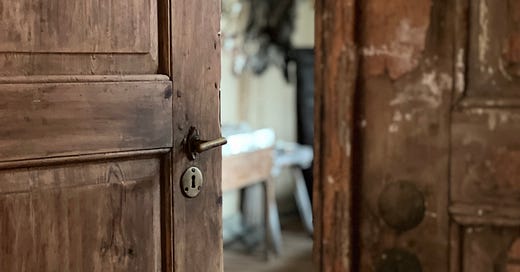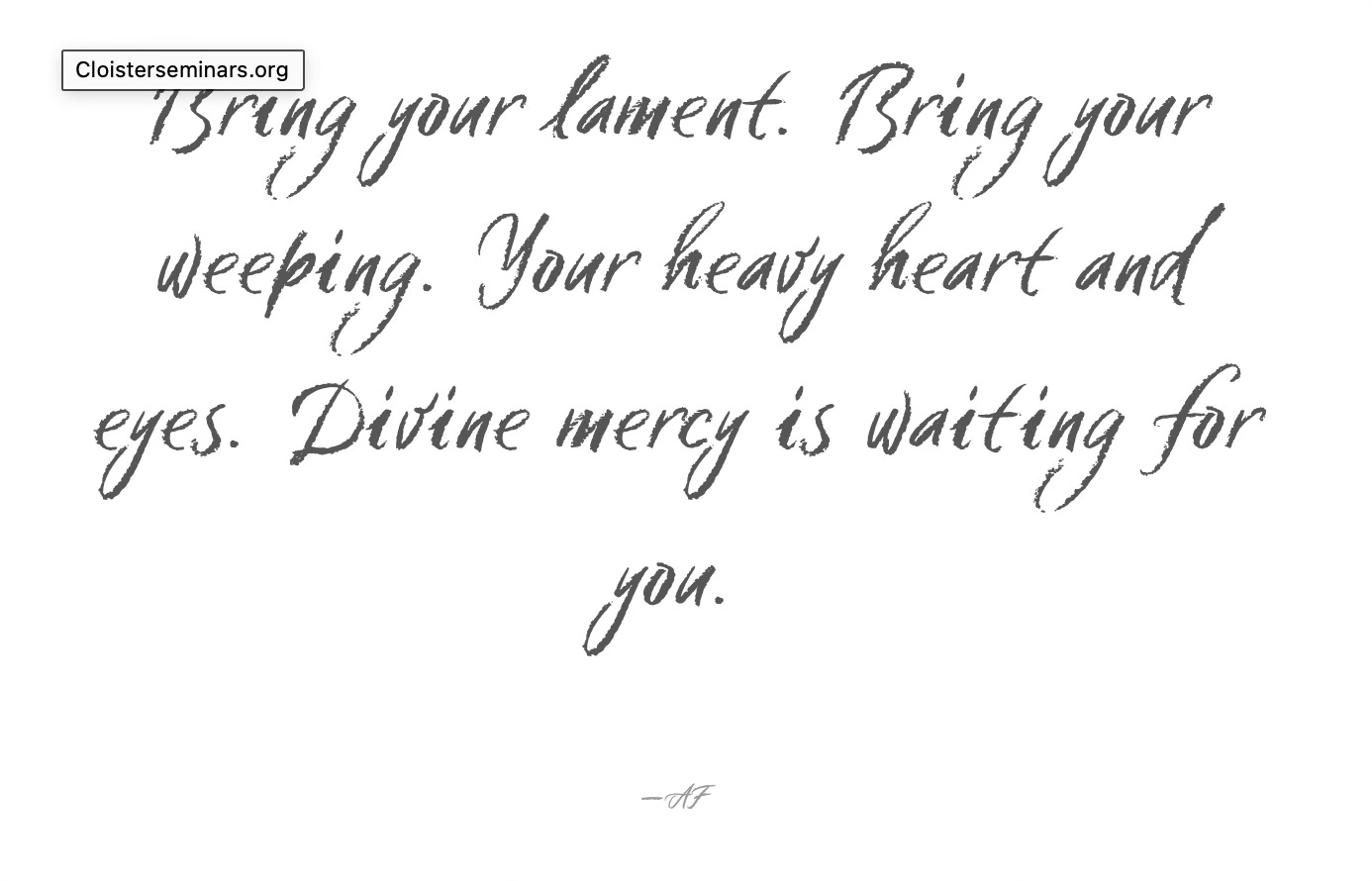Entering passion week in a pained world.
Let this haunting performance of JS Bach's Aria "Have mercy" by Marian Anderson at the Lincoln Memorial in 1939 move your heart, and the heart of this world, into a shared chorus of lamentation.
This is the first of our Passion Week Consolations 2025. If you wish to journey with us, and to receive our daily consolations in your inbox starting Monday make sure you have chosen the paid subscription tier. If you need a stipend for this journey, or wish to send your offering another way, please respond to this email and I will comp you in asap. Also, you can manage your subscription here.
Dear fellow pilgrim,
I am writing to you at the onset of this Holy Week in-front of an open window to our back yard. Spring has finally come to the American Upper Midwest and while my husband and little one nap away on this sunny afternoon I am thinking of you and this pilgrimage ahead of us.
I have been always attracted by the tunes of lament. Probably because I felt deep inside that our lamentation is like that open window to Spring. While the earth and branches are still bare new life is pulsing beneath the surface.
I came to understand Passion Week more and more as a remembrance of this very season, when we hold our sorrows in suspension while watching the Spring of resurrection unfold in front of our eyes.
And so these days I walk with our 6 year old every morning into the back yard to find some more signs of this coming resurrection. “Look! Mama, look! Another baby green!”
I have always loved JS Bach’s Aria “Erbarme Dich” from his Matthew Passion, and I have heard many moving interpretations over the years, some when singing in the Bach choir at the Munich philharmonic myself.
But when I came across this interpretation by Marian Anderson from almost eight decades ago, my heart broke open.
The pain of too many years watching this world spiral deeper and deeper into war and division and apocalyptic news, poured out through my tears.
It became immediately clear that I must share this haunting piece with you.
Must beg you to pause, and to listen, and to let your heart be moved, so we can together move this pained world.
Must beg you to share it with another soul, who will share it with another soul, so we all together can join into a communal lament
calling out for Divine mercy for our pained world and our pained hearts.
“Erbarme dich, mein Gott” (Have mercy, my God) from The St. Matthew Passion
In Memoriam: Marian Anderson (1897-1993)
So before peeling off the many layers of the story (some context is also given in the video itself) I invite you to take 8 min out of your day today and immerse yourself in the complexity and beauty of this performance, in the layers of personal and national history, the bearing of pain and the guarding of hope shared across the centuries.
Listen with your heart, if you can. Do not be afraid of your tears. We will dry them later.
Here are the lyrics:
Erbarme dich, mein Gott,
um meiner Zähren willen!
Schaue hier, Herz und Auge weint vor dir
bitterlich.
**Have mercy, My God,
for my tears' sake;
Look hither, heart and eyes weep before thee
bitterly.
Peeling off the layers
Bach’s aria “Erbarme Dich” in his St Matthew Passion is probably the most famous and beloved of the arias. In repetitive movements, the singer leans into her aching heart and the need for Divine mercy, supported by a few old instruments mimicking the heart’s weeping.
With his Passion JS Bach has created a grand lamentation. His music offers us a container for our sorrows and seduces us into beautiful lamentation.
Joining in this orchestrated experience of mourning can be self-soothing and a strategy for resilience in the face of tragedy.
Renowned contralto Marian Anderson was born in Philadelphia on February 27, 1897 and was described by famed Italian conductor Arturo Toscanini as a voice that comes along "once in a hundred years."
On April 9, 1939 Marian Anderson performed in-front of the Lincoln Memorial because she was denied access to Constitution Hall, Washington DC’s largest concert hall, by the Daughters of the American Revolution (DAR) because of her race.
First Lady Eleanor Roosevelt was a member of the DAR. Outraged by their decision, she famously resigned from the organization. This well-publicized controversy led to an invitation, sponsored by hundreds of Washington’s elite, to sing on the steps of the Lincoln Memorial.
A crowd of more than 75,000 people, came out to hear and support her, broadcasted live to millions more.1
1939 was a year of turning and foreboding around the world. It was the year when Europe fell into the most ugly and unforgiving war of the last century. It was still the height of the brutal Jim Crow South and the Great Migration of black people away from the oppression in the South on the American continent.
This passion story is the story of race discrimination that denied an accomplished musician her stage, redeemed by the heroic resistance of leaders and a silent crowd of 75,000 people at the heart of the nation.
“The incident”, writes Jeffrey Stevers, who created this haunting version of the 1939 concert pictures paired with the 1946 recording of the Bach Aria, “put both the artist and the issue of racial discrimination in the national spotlight.”
Marian Anderson “was the first African American singer to perform at the White House and the first African American to sing with New York's Metropolitan Opera.
The recipient of numerous awards and honors, Anderson was awarded the Presidential Medal of Freedom in 1963, the Congressional Gold Medal in 1977, the Kennedy Center Honors in 1978, the National Medal of Arts in 1986, and a Grammy Lifetime Achievement Award in 1991.”
Lament and Courage
I have always believed that changing one heart will change our world. And that starting with my own heart is the most difficult place to begin.
The world did not change immediately after this incredible concert in 1939 which moved the US and the world, nor the recording of the Bach Aria in 1946. And still, courage has taken hold and change has been brought to the hearts of many.
And then there was the courage of First Lady Eleanor Roosevelt. She was a member of the DAR. Outraged by their decision to deny Anderson access to the concert Hall because of her race, she famously resigned from the organization.
Changing one heart, dear people, is still what changes the world. Changing the heart of that one person who says “enough is enough,” I cannot bear this any longer, I must hold to what is humane and what is true.
The passion story isn’t a story of power and might. It does not teach greatness but humility. It does not pit race against race, religion against religion, or right against left.
The way of the cross leads us to lean into mercy, not might.
“Have mercy, My God, for my tears' sake;
Look hither, heart and eyes weep before thee bitterly.”
A blessing for your Passion Journey
Worried, sorrowful, hopeful,
let us now come – as we are
and walk – together
holding our sorrows
and the sorrows of this world
towards the glimmering
Easter light
of renewed life.
And may Divine mercy walk among us.Amen.
With love, Almut
For the subscribers of our Passion Journey
Dear fellow pilgrims, thank you for being here, for sustaining this journey and for trusting me with it through this Holy Week.
Monday’s post will gather us for our pilgrimage in a more intimate setting of paid subscribers (here is how to upgrade) as we will let our heart follow the movement of this week, walking from the valley of our sorrows to the Easter light, holding and transcending our own lamentation, soothed by pieces of Bach’s Passion Oratorio.
Keep reading with a 7-day free trial
Subscribe to Cloister Notes to keep reading this post and get 7 days of free access to the full post archives.






